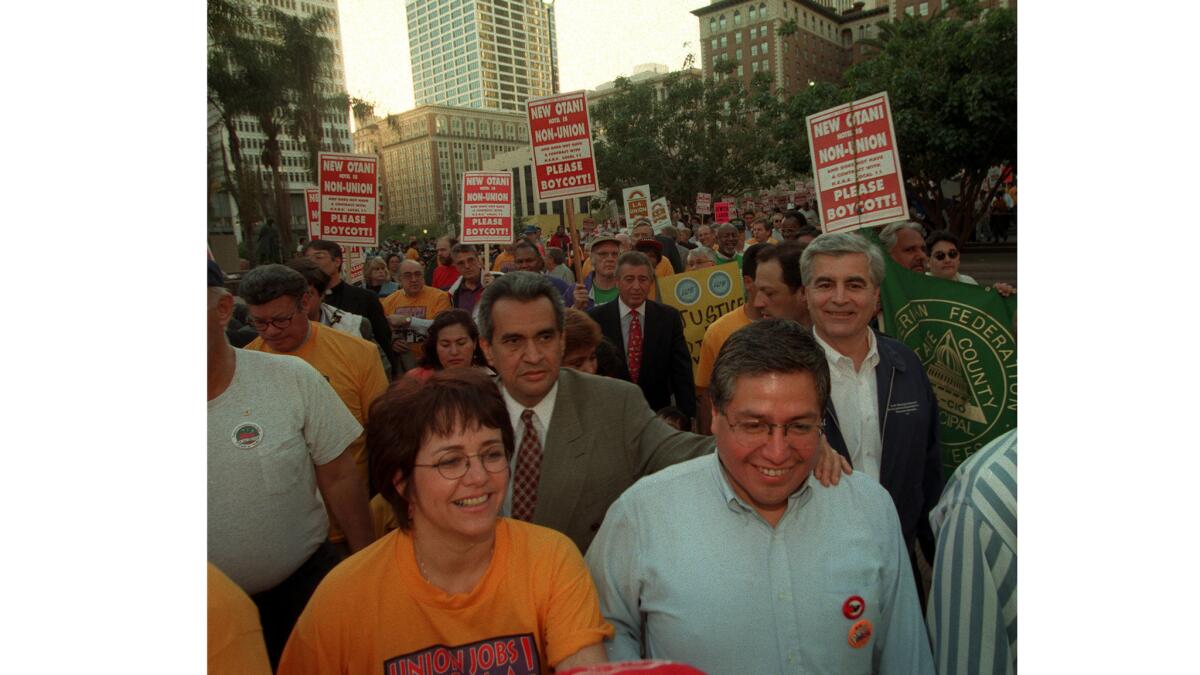Op-Ed: The unlikely power couple that remade L.A. politics

In 1988, anyone who suggested that L.A.’s preeminent power couple of the next quarter-century would be Miguel Contreras and Maria Elena Durazo — he, a regional official of the hotel workers union; she, a dissident activist in that union’s L.A. local — would have been advised, gently or otherwise, to seek counseling. Both Contreras and Durazo were children of immigrant farmworkers; both found their calling in a seemingly moribund labor movement; both plied their trade in a city where unions had never loomed large and were looming steadily smaller. No list of budding power couples would have placed them in the top 10,000.
Last week, Durazo announced she would soon step down from the top post at the L.A. County Federation of Labor — a position that she had held for eight years, and that Contreras had held from 1996 until his unexpected death in 2005. And considering her legacy, it is apparent that both she and her late husband not only amassed power in ways that L.A. had not seen before, but that they were the central figures propelling an unprecedented transfer of civic power to the city’s previously powerless, largely Latino and heavily immigrant working class.
When Contreras and Durazo met, she was leading a successful revolt against the corrupt leadership of the hotel workers local. By the early ‘90s, Durazo had transformed it into one of the few unions in L.A. that mobilized both its own members and liberals throughout the city in dramatic organizing campaigns that highlighted the abysmal pay and conditions under which immigrant workers labored. During those same years, Contreras became a skilled electoral operative, first for his union and then for the county federation, an umbrella organization that includes more than 300 L.A.-area locals. When Jim Wood, the County Fed’s chief officer, died in 1996, Contreras was elected his successor.
Contreras’ elevation came two years after the anti-immigrant Proposition 187, which had provoked a furious backlash within the Latino community. Contreras saw the potential for putting that anger to constructive use, realizing that the County Fed’s electoral efforts didn’t have to be confined to mobilizing its own members. He saw that labor could become a vehicle for mobilizing L.A.’s vast and under-politicized Latino community.
He put together a door-to-door registration drive followed by a get-out-the-vote operation that demolished the conventional wisdom that L.A. was too spread out for effective precinct walking. He incubated and backed the candidacies of progressives who came to dominate the City Council and L.A.’s state legislative and congressional delegations. And as demographic change swept over California and term limits provided a constant stream of open seats, Contreras headed the efforts that made labor at times the most powerful player in L.A. politics. His efforts helped transform the state’s political complexion from purple to blue.
As Contreras was the master political strategist, Durazo was more the movement’s indignant conscience, demanding a fairer wage and a better life for the half-million kitchen workers, day laborers, nurses’ aides, domestics and all the others who make L.A. the nation’s capital of low-wage work. She and attorney Madeline Janis founded and guided the L.A. Alliance for a New Economy, which over the last two decades devised living wage ordinances that raised the incomes of workers on publicly funded projects, formed coalitions with environmentalists to clean up the air at the harbor, and helped win a raise for the city’s hotel workers. The electoral clout that Contreras and Durazo helped bring to L.A.’s immigrant community was also key to the city’s decision to keep its police from handing over immigrants charged with minor offenses to federal immigration authorities.
Such groundbreaking victories became models for cities across the nation. But Durazo has continually insisted they were insufficient. The living wage ordinances and policies that made it easier for workers to unionize in selected industries were important, but failed to raise the incomes of most of L.A.’s poverty-wage workers. Only now, with the County Fed spearheading a campaign to set a local minimum wage at a level that would enable full-time workers to escape poverty, has labor amassed the power to make a difference in hundreds of thousands of local households. Similarly, Durazo argued, local police policies and state-level Dream Acts were major achievements, but were nonetheless poor substitutes for a federal policy enabling longtime undocumented immigrants to become citizens. Now, she is stepping down from the Fed to become a full-time leader of the fight for immigration reform.
What Contreras and Durazo did was to transfer political power in Los Angeles to the previously powerless, and through that, begin the work of boosting the incomes of the city’s working poor. That’s a power couple.
Harold Meyerson is editor-at-large of the American Prospect and an op-ed columnist for the Washington Post.
Follow the Opinion section on Twitter @latimesopinion
More to Read
A cure for the common opinion
Get thought-provoking perspectives with our weekly newsletter.
You may occasionally receive promotional content from the Los Angeles Times.










